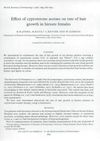 11 citations,
April 2017 in “The European Journal of Contraception & Reproductive Health Care”
11 citations,
April 2017 in “The European Journal of Contraception & Reproductive Health Care” Cyproterone acetate with ethinyl estradiol is effective for treating skin symptoms related to high androgen levels, like in PCOS.
 2 citations,
March 2004 in “Reviews in Gynaecological Practice”
2 citations,
March 2004 in “Reviews in Gynaecological Practice” Hormonal changes and psychological issues can cause sexual dysfunction in postmenopausal women. Behavioral therapy is recommended first, with hormone replacement helping some symptoms but not libido. Testosterone can improve libido, but its effects on overall sexual function are unclear. Emotional and relationship issues should be addressed before using medication, and the benefits and risks of testosterone supplementation should be considered.
[object Object]  March 2017 in “InTech eBooks”
March 2017 in “InTech eBooks” Acne vulgaris is a common skin condition that can cause low self-esteem and depression, and early treatment is important to prevent scarring.
 22 citations,
October 2018 in “British Journal of Haematology”
22 citations,
October 2018 in “British Journal of Haematology” Women have a higher risk of blood clots from hormonal factors and need careful treatment, especially during pregnancy.
 441 citations,
May 2008 in “British Journal of Pharmacology”
441 citations,
May 2008 in “British Journal of Pharmacology” Anabolic steroids can build muscle and strength but have risks and need more research on their clinical benefits and side effects.
 378 citations,
November 2011 in “Human reproduction update”
378 citations,
November 2011 in “Human reproduction update” Experts recommend using evidence-based methods to diagnose and treat hirsutism, focusing on symptoms and underlying causes.
 92 citations,
May 2014 in “The American Journal of Medicine”
92 citations,
May 2014 in “The American Journal of Medicine” The conclusion is that early diagnosis and a multi-system treatment approach are crucial for managing PCOS and its associated health risks.
 30 citations,
October 2014 in “Journal of The American Academy of Dermatology”
30 citations,
October 2014 in “Journal of The American Academy of Dermatology” A team approach is crucial for managing PCOS, with dermatologists playing a key role.
 January 2022 in “Springer eBooks”
January 2022 in “Springer eBooks” The document discusses how to diagnose and treat conditions like acne, excessive hair growth, and female pattern hair loss related to hormone imbalances.

Cyproterone acetate with ethynyl estradiol significantly improved acne and seborrhea in women, but was less effective for hair loss and excessive hair growth.
 8 citations,
April 1990 in “Hormone and Metabolic Research”
8 citations,
April 1990 in “Hormone and Metabolic Research” The medication combination did not affect glucose tolerance but increased some cholesterol levels due to its estrogen component.
 24 citations,
January 2010 in “Annales d'endocrinologie”
24 citations,
January 2010 in “Annales d'endocrinologie” For women with moderate to severe unwanted hair growth or acne, birth control pills are the first choice, with other medications like cyproterone, spironolactone, flutamide, or finasteride as alternatives, and permanent hair removal should be done with electrolysis or laser.
 16 citations,
January 2007 in “Journal of Obstetrics and Gynaecology”
16 citations,
January 2007 in “Journal of Obstetrics and Gynaecology” The document suggests various treatments for PCOS, including medication for menstrual issues, insulin resistance, and excess hair, as well as fertility treatments, while highlighting the need for personalized care and lifestyle changes.
 January 1983 in “Elsevier eBooks”
January 1983 in “Elsevier eBooks” Cyproterone acetate is used to treat conditions like prostate cancer, early puberty, excessive sexual drive, and female androgenization by affecting androgen functions and suppressing certain hormones.
 26 citations,
December 1981 in “British journal of dermatology/British journal of dermatology, Supplement”
26 citations,
December 1981 in “British journal of dermatology/British journal of dermatology, Supplement” Cyproterone acetate reduced hair growth in most hirsute females and made hair softer, thinner, and lighter.
 January 2014 in “Side effects of drugs annual”
January 2014 in “Side effects of drugs annual” Exposure to certain sex hormones can increase health risks, while some hormone therapies may offer benefits for specific conditions.
 5 citations,
May 2017 in “Current Opinion in Pediatrics”
5 citations,
May 2017 in “Current Opinion in Pediatrics” Hormonal therapies are safe and effective for treating acne in female adolescents, with specific treatments for those with endocrine disorders.
 September 1999 in “The Journal of The British Menopause Society”
September 1999 in “The Journal of The British Menopause Society” The document concludes that skin aging in women can be caused by UV exposure and hormonal changes, and treatments like hormone replacement therapy and various skin therapies can help.
 57 citations,
December 2018 in “JAMA Surgery”
57 citations,
December 2018 in “JAMA Surgery” Hormone treatment for transgender patients may not need to be stopped before surgery, but more research is needed, especially on estrogen.
 2 citations,
January 2017 in “Cambridge University Press eBooks”
2 citations,
January 2017 in “Cambridge University Press eBooks” Manage PCOS in primary care with weight loss, psychological support, medication, and monitoring for health risks.

Different drugs are used to manage breeding, prevent or end pregnancy, and treat reproductive issues in dogs and cats.
 166 citations,
October 2018 in “Endocrine Reviews”
166 citations,
October 2018 in “Endocrine Reviews” Hormone treatments for transgender individuals generally improve mental health and physical transition, with some health risks that require medical supervision.
 131 citations,
August 2004 in “Best Practice & Research in Clinical Obstetrics & Gynaecology”
131 citations,
August 2004 in “Best Practice & Research in Clinical Obstetrics & Gynaecology” The conclusion is that PCOS is caused by ovarian sensitivity to hormones and disrupted hormone control, possibly due to ovarian factors, and more research is needed.
 97 citations,
November 1986 in “Journal of Steroid Biochemistry”
97 citations,
November 1986 in “Journal of Steroid Biochemistry” Antiandrogens affect androgen-dependent body functions and are used for various medical conditions, with some risks like fetus feminization, but new forms like 17α-propylmesterolone show promise for acne without systemic effects.
 59 citations,
February 2021 in “BMJ”
59 citations,
February 2021 in “BMJ” High doses of cyproterone acetate increase the risk of brain tumors in women, but the risk decreases after stopping the medication.
 47 citations,
November 2012 in “Expert Opinion on Therapeutic Patents”
47 citations,
November 2012 in “Expert Opinion on Therapeutic Patents” The document concludes that research on sulfatase inhibitors should continue due to their potential in treating various diseases, despite some clinical trial failures.
 34 citations,
January 2011 in “Fundamental & Clinical Pharmacology”
34 citations,
January 2011 in “Fundamental & Clinical Pharmacology” New treatments for PCOS show promise, but no current medication treats all aspects of the condition.
 21 citations,
January 2003 in “Seminars in reproductive medicine”
21 citations,
January 2003 in “Seminars in reproductive medicine” The document concludes that various drugs can manage symptoms and metabolic issues in women with PCOS.
 19 citations,
September 2004 in “Reviews in gynaecological practice”
19 citations,
September 2004 in “Reviews in gynaecological practice” Effective hirsutism management requires identifying the cause, combining new and traditional treatments, and setting realistic expectations for patients.
[object Object]  12 citations,
May 2005 in “Current obstetrics and gynaecology/Current obstetrics & gynaecology”
12 citations,
May 2005 in “Current obstetrics and gynaecology/Current obstetrics & gynaecology” Hirsutism is too much hair growth in women like the pattern in men, often caused by high male hormones, and can be treated with hormone control and hair removal methods.






























